 Dear, dear friends, customers, fans, and followers.
Dear, dear friends, customers, fans, and followers.
Here is our long-awaited Best Books of 2023 list. (At least I hope it was awaited by somebody out there.) We had a lot of end of year mail order work (thank you!) and then I got sick and we were exhausted and we had two webinars (thank you!) and, and, well… enough with the excuses.
All books are 20% off. Scroll to the bottom to find the link to our secure order form page at our website. We will reply promptly and confirm everything. THANKS for your support.
As I say in different ways each year — sometimes with more subtlety — I am not qualified to say what the “Best Books” are. Our metrics surely aren’t sales data, let alone our sales data, feeble as it is. No, I’d say these are just some of my favorites, although I’ve eliminated a few that brought Beth or me real pleasure or interest this year but they may be less than viable for a list that I hope gets noticed, at least in some rare corners of the interwebs. So these are some of our favorites that we hope to sell.
I think these are excellently written and/or wisely considered and/or nicely making a significant contribution. Not every one is rocket science but most offer something very, very special. I stand by them all and we applaud these authors for making it onto our list of true favorites. I recommend them, one and all and think you will be glad to expand your library a bit with these Hearts & Minds award winners.
You will notice that I try to honor one or two particular books but in several categories I name a few, not knowing how to discriminate which is “better.” In most categories, there are really strong books that are good for this reason or that, appealing to this sort of reader or that. I can’t often say just one is *the* very best. Sorry.
Please stay tuned for PART TWO landing in subscriber’s inboxes in the next day or so. I’m already working on that and it, too, will be a fun and rewarding list.
Ladies and gents, book-lovers, all, here we go:

MY TOP TWO FAVORITE NONFICTION BOOKS OF 2023
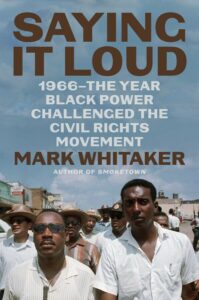 Saying It Loud: 1966–The Year Black Power Challenged the Civil Rights Movement. Mark Whitaker (Simon & Schuster) $29.99 OUR SALE PRICE = $23.99
Saying It Loud: 1966–The Year Black Power Challenged the Civil Rights Movement. Mark Whitaker (Simon & Schuster) $29.99 OUR SALE PRICE = $23.99
I’m starting with a biggie, right out of the gate — my very favorite books, the best book I read all year. I tore through this, mouth agape, reading stuff out loud to Beth and anybody else that would listen. I thought I knew something about the history of the civil rights movement and I have read a number of excellent books on various aspects of the topic. This one is riveting, informative, extraordinary, stunning. I may focus on a specific year of the civil rights movement but its breadth is amazing and it is a page-turner that will make you want to know even more, and appreciate the work of contemporary historians. Kudos!
I think you may want to have this important work in hardcover but we are starting a waiting list for those who want the paperback (at $19.99 – less our 20% off = $15.99) which releases on February 6th, less than a month away. If you want to pre-order the cheaper paperback let us know.
I was in high school in 1966, and it felt like the edge of history. In his brilliant new book, Saying It Loud, Mark Whitaker has taken me back there, and the journey is both enthralling and a riveting reminder of the tumult, inspiration, and potent possibilities of the Black Power movement. It’s also novelistic in its fully realized human portraits of the movement’s backstory. I can’t say it any louder: this is not only a compelling read; it’s essential for understanding where we started and where we might find lessons in determining where we go from here. — Henry Louis Gates, Jr., Harvard University, author, The Black Church: This Is Our Story, This Is Our Song
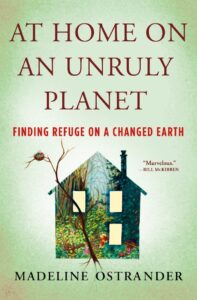 At Home on an Unruly Planet: Finding Refuge on a Changed Earth Madeline Ostrander (Holt) $28.99 OUR SALE PRICE = $23.19
At Home on an Unruly Planet: Finding Refuge on a Changed Earth Madeline Ostrander (Holt) $28.99 OUR SALE PRICE = $23.19
Although somebody somewhere has formally categorized this as a book of science, and in some ways it may be, it is vivid, robust, dramatic storytelling in the form of embedded reporting, a years-in-the-making expose of four very different locations impacted by global climate change. The brave and generous (and oh-so-talented) writer Madeline Ostrander visits four locales, telling us about individuals she meets with, over and over, as they grapple with extraordinary tragedies in their lives which have been upended by bad climate matters.
She embeds herself with rural forest fire-fighters in Idaho, bringing us to the heartbreak of whole towns being wiped out, telling the tender stories of those who lost everything in several of the largest fires in American history. She goes to Saint Augustine, Florida, a historic American city if ever there was one, threatened regularly with flooding, learning from historical preservationists and civic leaders the dangers of losing artifacts and space and wondering what to do as the sea levels rise. (She visits Annapolis, Maryland, as well, as a connected story about local citizens caring to preserve the rich places and stuff of American history, and it was riveting.)
Thirdly, she tells the exceptionally dramatic story of North America’s first bone fide climate change refugees as she moves to a cold (but warming) rural, Alaskan, Yupik village learning about the melting permafrost, glaciers, and formerly solid ground that is sinking, literally, below their feet. Whole Yupik villages must be moved and the industrial vehicles needed sink in the mud; will these native peoples endure in their homes and schools and towns? Ostrander’s prose will keep you turning the pages, perhaps between gasps and tears. You will learn about the realities of climate change (don’t let anyone fool you as if this isn’t happening to our fellow citizens) but, more, you will learn about a sense of place, a view of home, of homefulness…
Fourthly, she visits repeatedly an ongoing story of mostly black, urban activists in San Francisco who are unbelievably impacted by one of the largest examples of flagrant pollution, with explosions and fires and toxic dumps from a nearby Standard Oil refinery ruining urban gardens and endangering tens of thousands of mostly poor folks in the Richmond neighborhoods. These sections are inspiring as she tells about brave leaders doing urban activism, working for economic development and civic renewal all the while involved in demands for justice and restitution from the powers that be who were in league with the refinery’s negligence.
As she takes us into the lives of those rebuilding communities in the wake of climate disasters, she is not only giving us a set of interwoven stories to show how the climate emergency effects so many different sorts of ordinary Americans, but she offers stores of resilience and hope. As author Michelle Nijhuis puts it “Amid the devastation and loss, she finds creativity, vital hope, and a sense of home that outlasts any address.”
Her writing is often luminous, her reporting detailed, her vision about the role of home and local renewal is nothing short of beautiful. With frontispieces from Wendell Berry and Barry Lopez, you’ll know she is a fine writer. When she reminds us, in the words of Greta Thunberg, to “act like the house is on fire because it is” you will know this long and compassionate book is worth every page.
Shows that the meaning of home is so powerful that people will make surprising, imaginative, even transcendent leaps to hold on to theirs. By this book’s end, you realize that maybe you could, too.” — Alan Weisman, author, The World Without Us
MY FAVORITE BOOK ON SPIRITUAL FORMATION
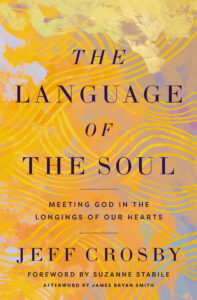 The Language of the Soul: Meeting God in the Longings of Our Hearts Jeff Crosby (Broadleaf Books) $26.99 OUR SALE PRICE = $21.59
The Language of the Soul: Meeting God in the Longings of Our Hearts Jeff Crosby (Broadleaf Books) $26.99 OUR SALE PRICE = $21.59
What a huge category this is. I’ll weave through this column a few more great reads on contemplative spirituality and faith practices that enhance our interior lives but if I were to pick one that I truly know touched my heart and brought such pleasure in reading it, it would doubtlessly be this release from last Spring by the former senior editor of InterVarsity Press and now the head of the ECPA (the Evangelical Christian Publishers Association), our friend Jeff Crosby. I admire Jeff very much, not least because he is a lover of the printed page who appreciates all sorts of writers and who knows a thing or two about very good books. His lovely balance of gentle, thoughtful writing, good stories, and a very fun sub-theme of loving music, makes this a book about spiritual formation and longing and affection and care and renewal and more. I kept turning the pages, taking in his finely chosen quotes, his Biblical reflections, and his illuminating stories. Crosby knows many a fine writer — such as Christopher de Vinck, a best friend of both Henri Nouwen and Mr. Fred Rogers, if that gives you a hint of his range — and there is a fine forward by spiritual director Suzanne Stabile and a beautiful afterword by James Bryan Smith (of the “Good and Beautiful” series.) It doesn’t offer arcane mysticism or an over indulgence in eccentric monastic practices, but wise, solid, reflection on what we long for, what we love, how God guides us through life’s journey. You will learn more about how to name all this as this book will give you a fresh language for your soul. Highly recommended.
HONORABLE MENTIONS in spiritual formation
There are many great titles in this genre that deserve to be mentioned honorably, but I’ll name just two that I think are among the best this year.
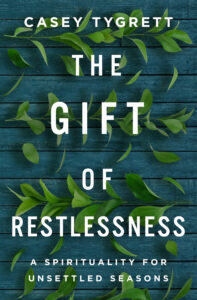 The Gift of Restlessness: A Spirituality for Unsettled Seasons Casey Tygrett (Broadleaf Books) $18.99 OUR SALE PRICE = $15.19
The Gift of Restlessness: A Spirituality for Unsettled Seasons Casey Tygrett (Broadleaf Books) $18.99 OUR SALE PRICE = $15.19
Maybe you, like me, have a love for, but slight discomfort about, the many books that arrive in the category of spirituality. From deeply mystical works to those promoting inner transformation through focus on God’s grace to those that seem more psychological in nature than deeply relying on the Holy Spirit, they are often really good, yet, sometimes, I fear that most carry some baggage, sneaking an implicit dualism between faith and life, soul and body, the sacred and the seemingly secular. Do some of the modern contemplatives merely assume the medieval and early church synthesis with Neo-Platonism and Greek dualisms? Too many have some distinction between our inner and outer lives, our personal and public lives, what some even so bluntly might call our higher and lower lives.
Yet, many good writers of spiritual transformation properly affirm our life in God’s good world, our public, civic, and communal relations, our daily discipleship before God, rather than overindulging in navel-gazing and inner ecstasies. One such balanced, robustly human, deeply Christ-centered author is Casey Tygrett. He wrote a book about the human task of remembering and another on the joys of curiosity. Hooray.
The Gift of Restlessness is a book that reminds us that we are human. It is, in the words of one reviewer, “honest and raw and real.” It invites us to “reset” but not without adequately honoring the fragility of our human condition. As it asks on the back, “what if spiritual questions are not problems to be solved but invitations of the soul.” You see, here he “upends the notion that restlessness isa sign that we must move up, move one, or move out.” No, he invites us to pray well (using Jesus as a model) to create “a spirituality study enough for our unsettled seasons.” He writes well, so much that Marlena Graves calls it “a beautiful book.”
I was captivated by his well-written first pages as he sat in a treatment facility with his wife as they were admitting a teenage child amidst a mental health crisis; the sorrow was palpable, the situation plain enough, his comment that he wanted to pray but couldn’t quite, fully understandable. I was hooked. You will be too.
This is spiritual formation for real people in the real world. He invites a reflective attention to deeper questions about who we are and the nature of the world and the fidelity of God. He tells good stories and invites us to know God, even in our times in the wilderness. Which for most of us, is most of the time.
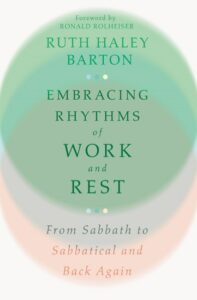 Embracing Rhythms of Work and Rest: From Sabbath to Sabbatical and Back Again Ruth Haley Barton (IVP) $25.00 OUR SALE PRICE = $20.00
Embracing Rhythms of Work and Rest: From Sabbath to Sabbatical and Back Again Ruth Haley Barton (IVP) $25.00 OUR SALE PRICE = $20.00
Long time readers of BookNotes will know how we so esteem our friend Ruth Haley Barton and how much her several books mean to us. She is at one ecumenical, drawing on the best spiritual writers from throughout time and denominational affiliation, and clear, practical, kind. Not every spiritual director (believe it or not) has such pastoral sensibilities and not every mystical writer has the charming ability to connect with ordinary readers. Ruth is one of the top tier writers of whom I often say that I would read anything she writes.
Alas, I wasn’t so interested in this one. It is a struggle for us in our family business to keep a mature and wise Sabbath; we have rarely taken lengthy vacations and a sabbatical is simply out of the question, as it is for most folks with normal jobs.
Yet, yet, yet: I am so glad I read this remarkable book, this mature reminder that “the goodness is in the rhythm.” I love that she reminds us that the journey to sabbath practice is “slow and gradual and it is a journey we need to take in community.” Oh my. How I related to her own story of practicing sabbath, her hard-won insights, even if her story is somewhat different than mine. How I appreciated, once again, reading about practical steps for “embedding sabbath rhythms in our personal lives, as well as our churches and organizations.” Many of us have a long way to go, despite the many good books and resources about this theme. Embracing Rhymes is a fabulous contribution and a major work. That some of it is about extended retreats and sabbaticals is important for anyone in ministry or those who care about this in ministry, even if it isn’t evidently obvious that most of us can do this. She isn’t unaware of this, either, and her insights are friendly, supportive, and direct.
There are tremendous quips and blurbs on the back, from Reformed theologian and teacher Kelly Kapic to racial justice activist Brenda Salter McNeil, from leadership scholar Tod Bolsinger to black poet, pastor, and organizer, Drew Jackson. There is a tremendous, nearly rare introduction by the great Catholic writer Ronald Rolheiser who not only shares why this book is so useful, but why it is especially important for faith leaders.
BEST BOOK OF POPULAR THEOLOGY
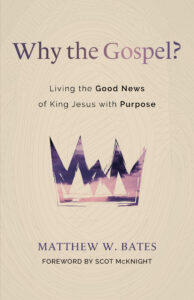 Why the Gospel? Living the Good News of King Jesus with Purpose Matthew Bates (Eerdmans) $17.99 OUR SALE PRICE = $14.39
Why the Gospel? Living the Good News of King Jesus with Purpose Matthew Bates (Eerdmans) $17.99 OUR SALE PRICE = $14.39
We have our share of academic textbooks and major work of serious theological scholars. But our wheelhouse is what some call popular theology or applied theology, serious and oftentimes systematic study of the doctrines of the Christian faith but for ordinary readers (not the academic guild) showing out basic Christian living can be deepened and enhanced (of not revolutionized and reformulated) by reading accessible ruminations of theological themes.
Professor Bates is a master of this sort of stuff, having written two academic books (that are, nonetheless, approachable enough that any college educated reader could handle them — see, for instance, his magisterial Salvation by Allegiance Alone: Rethinking Faith, Works, and the Gospel of Jesus the King or the more popular level summary of that in Gospel Allegiance: What Faith in Jesus Misses for Salvation in Christ published by Brazos in 2019. He again has now popularized his work in an easy to read and (for some) mind-blowing little book showing how the way he formulates the gospel is most faithful and why it matters. In asking “why” Jesus came and why the gospel message is so powerfully needed, he gets at so many of the weaknesses of both casual mainline liberal theology and pious evangelicalism as well. The gospel, as many have shown these days (just think of N.T. Wright) is not that we are forgiven, but that the new King has come, that there is a regime change on planet Earth, that a historic announcement has been made that the Kingdom of God has been inaugurated.
If you still think that the gospel proclaimed by Jesus and Paul is that Jesus died for your sins, you need to read this little book. Of course, Jesus did die and rise and ascend for our sins, but the message of the Bible is that this good news of salvation through faith by grace is only the door into the real “gospel” Good News which is that the Kingdom of God is at hand.
And we are called to participate in that, sharing, quite literally, the glory of Christ in his new temple — all creation!
Why did God do this? Why does the Bible explain the gospel in these broad terms (of what some may summarize as “creation regained”?) Why have we missed so much? What does our allegiance to the Kingly reign of Christ matter so much? This little book of fresh and sensible exploration of solid Biblical teaching is my vote for the best book of applied theology I’ve read this year. Please, please, spread the word. This would make a fabulously rich and profound book for an adult ed class, a small group study, or Zoom course.
A provocative book because the church needs this kind of provocation, Why the Gospel? draws from complex and cutting-edge research to present timeless truths with inviting clarity. Anyone who senses that the gospel they’ve received is a tepid and ineffective counterfeit to God’s revelation of grace and power will benefit from Bates’s bold reminder that Jesus is King. —Amy Peeler, professor of New Testament, Wheaton College, author of Women and the Gender of God
Previous generations asked if there was evidence to support the claims of Christianity. Mountains of apologetic resources were created to address this question. But a new generation has emerged that isn’t focused on the gospel’s credibility, but rather its plausibility. Before asking whether it’s true they want to know why the gospel even matters. Matthew Bates has written the book our generation needs. He not only helps us rediscover the radical message of Jesus and his apostles, but he shows why this gospel is far larger than a narrow call to individual salvation. It’s the message the church, and the world, has been waiting for. — Skye Jethani, cohost of The Holy Post podcast, author of What If Jesus Was Serious
HONORABLE MENTION in popular theology
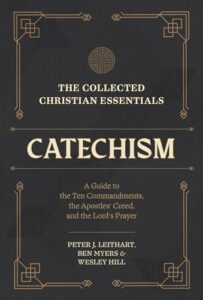 The Collected Christian Essentials: Catechism – A Guide to the Ten Commandments, the Apostles’ Creed, and the Lord’s Prayer Peter Leithart, Ben Myers, and Wesley Hill (general editor Todd R. Hains) (Lexham Press) $36.99 OUR SALE PRICE = $29.59
The Collected Christian Essentials: Catechism – A Guide to the Ten Commandments, the Apostles’ Creed, and the Lord’s Prayer Peter Leithart, Ben Myers, and Wesley Hill (general editor Todd R. Hains) (Lexham Press) $36.99 OUR SALE PRICE = $29.59
Many customers have loved the small white “Christian Essentials” hardbacks on several topics published by Lexham (with great looking black and white interiors and just enough substance to be substantial, but short and accessible enough for nearly any reader.) We’ve really appreciated these; I have said, I think, that Ben Myer’s one on the Apostles Creed is the best concise treatment ever and BookNotes fans might know I am a fan of Wes Hill and read all his work. His ruminations on the Lord’s Prayer are second to none.
I suppose it was Martin Luther who first put together a short catechism composed of the Ten Commands, the Creed, and the Lord’s Prayer. I am only being somewhat tongue in cheek, but, golly: what more do you need to know? In this lovely trim sized hardback, these three small books are combined into one solid volume. It was a stroke of marketing genius, I thought; sure. All three in one. But upon opening Catechism: The Collected Christian Essentials s realized how much care and attention the publisher offers to make this not merely. a three-in-one compilation, but a true resource for Christian growth. There is a very good opening piece about the nature of catechism. There is a several page article on ordered prayer, offering a guide for liturgy, especially some texts for confession and forgiveness. There are some morning and evening prayers, Biblical texts to use, all typeset handsomely with some touches of color and something akin to a sacred Celtic design.
Man, this is well done, with some gold-colored pages, some graphic type, even including a ribbon marker, making it a really handsome study resource and a very nice gift. I suppose Anglican or Lutheran folks might most appreciate its somewhat liturgical feel, but, truly, this is a great book for anyone. We are delighted and happy to highlight it here in our end of the year’s “Best of” list. Thanks be to God.
BEST BOOK OF CULTURAL ANALYSIS
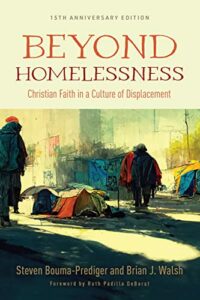 Beyond Homelessness: Christian Faith in a Culture of Displacement Stephen Bouma-Prediger & Brian J. Walsh (Eerdmans) $39.99 OUR SALE PRICE = $31.99
Beyond Homelessness: Christian Faith in a Culture of Displacement Stephen Bouma-Prediger & Brian J. Walsh (Eerdmans) $39.99 OUR SALE PRICE = $31.99
As I hope you know, I highlighted this recent 15th anniversary edition in a recent BookNotes and hosted an hour-long webinar conversation with these two scholars (Shane Claiborne calls Brian a “theologian activist”) about this expanded version of the older book. Reading the new preface (by Ruth Padilla DeBorst, writing from her hopeful community of hospitality in Costa Rica) and the long new chapter bringing many of the arguments of the book up to date, I was even more moved than I was the first time I read this stunning work. I reviewed in 15 years ago, citing how it covers so very much — from postmodern mobility that allows some rich people to have many houses but no homes, and some poor folks to be unhoused but still with some sense of place in the world through their community of home — that is all closely related to our ecological homelessness. These two (one a farmer ecologist theologian and one a professor of theology with an emphasis on creation care) have so much insight about the changing culture and contemporary philosophy and yet their expansive work is always rooted in the Biblical narrative and always down-to Earth. They care for the poor quite literally and show their solidarity with the marginalized by citing poets of the street and telling the stories of indigenous friends.
Whether you need a really fresh and creative dive into the Bible or whether you want a big picture study of Christian cultural studies or whether you want to understand domestic poverty and its connection to global capitalism, well, this book does it all. It was an award winner 15 years ago and deserves to be honored as such now, again.
(Stay tuned here at BookNotes and at our store’s Facebook group page where we will link to last week’s webinar once we get it polished and ready to share. Hooray.)
HONORABLE MENTIONS in cultural analysis
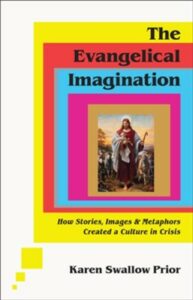 The Evangelical Imagination: How Stories, Images, and Metaphors Created a Culture in Crisis Karen Swallow Prior (Brazos Press) $26.99 OUR SALE PRICE = $21.59
The Evangelical Imagination: How Stories, Images, and Metaphors Created a Culture in Crisis Karen Swallow Prior (Brazos Press) $26.99 OUR SALE PRICE = $21.59
I have written about this several times this past year and have ballyhooed it heartily where’ve we went. (Yes, including the knowingly tacky cover!) It has been one of my favorite books this year (and I am not alone) and a real pleasure to read. I learned much and enjoyed much.
I thought it was very well written and an exceptionally important testimony, in part because of Karen’s own rather public life as a scholar who taught beloved students at Liberty University, even as Falwell was destroying the integrity of the place. She never quite fit the fundamentalist mode, there, and never was a right-wing MAGA-type, so, like some other well know women who dared to offer a moderate voice among the idolatry of the far right, she paid dearly. On-line abuse, threats of sexual violence, gross and disgusting trolls and lost friendships came her way, shockingly, for those of us who don’t live in that world of far right extremism. Who knew it could be that ugly — among Christian people! She endured on with a gracious and moderate tone guided by a Biblical sensibility and continued to write about life and literature, public faith, and evangelicalism’s strengths and foibles, which she came to know more personally than I suppose she had expected.
In some ways, this well-researched work follows from her previous deep dive into early Victorian faith from when she produced the notable biography of 18th century writer and activist Hannah More (who was a colleague in abolitionist work with the more famous William Wilberforce, both who died in 1933.) Prior shows that much of American evangelicalism as a faith tradition has roots in Victorian English culture and religious impulses from previous eras which offered a social imaginary as much as a doctrinal system.
This fabulous book is both a history and contemporary study, again, less of an exploration of how evangelicalism’s doctrinal and theological views have come to be understood — she is an evangelical herself and holds to most of those standard convictions — but more how the “stories and images and metaphors” shaped the way most evangelicals see the world and lean into it. It is very much about just what the title promises, the evangelical imagination. If American evangelicalism is suffering from an identity crisis (and what religious tradition is not these days?) then this book could help, surely it could help. In analyzing her own sub-culture’s history and stories and art, she offers not only a glimpse into how to be self-aware about one’s religious biases and how they play out but gives tools and insight for all of us to understand the religious landscape of the 21st century. Evangelical or not, you should read it. It is that important.
Prior is among the most helpful Christian literary critics writing today. Her call for the reformation of evangelicalism is a call to repent, to allow new metaphors and analogies to drive us to more faithfully read and put into practice the Scriptures. An insightful work of love that aids a holy transformation of our imaginations. –Tish Harrison Warren, Anglican priest, author of Liturgy of the Ordinary and Prayer in the Night
As an artist and follower of Jesus often falling into the gaps and fractures of the church and the world, I found this book to be a refreshing and eye-opening guide to navigating beyond the borderlands. Sanctified imagination is critical in developing as the body of Christ, in being the harbingers of hope and creators of beauty, and Prior is one of the most trusted voices to help us find our thriving. — Makoto Fujimura, artist, author of Art and Faith: A Theology of Making
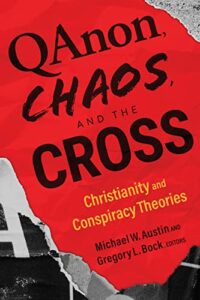 QAnon, Chaos and the Cross: Christianity and Conspiracy Theories edited by Michael Austin and Gregory Bock (Eerdmans) $24.99 OUR SALE PRICE = $19.99
QAnon, Chaos and the Cross: Christianity and Conspiracy Theories edited by Michael Austin and Gregory Bock (Eerdmans) $24.99 OUR SALE PRICE = $19.99
I’ll admit that I wasn’t sure if I wanted to name this as a “Best Book of 2023” — it seems outlandishly niche, and maybe even controversial. But I sure feel that I need to mention it, as honorably as possible, suggesting it surely as a favorite and, more importantly, as one of the most timely and needed books of the year. There are a few other such volumes, and one or two coming, so wise publishers are realizing that normal people need resources to help us navigate this screwy world of conspiracies and weird disinformation and profound polarization. This 2023 book is a very wide collection of various sorts of fairly academic pieces, all highly connected to traditional Christian faith and the best theological wisdom. It deserves a special place on this list as there is nothing like it. Many of these articles and essays are very, very helpful even if, as with any large collection of essays, some pieces will interest some readers perhaps more than others. It’s over 285 pages with two dozen contributors.
As David Gushee puts it, this is a “generous and substantive engagement with the problem of conservative Christian susceptibility to conspiracy theories.” It is both a reasonable call to resist Trumpian misinformation (no matter how many ‘best dressed lists’ Eric Metaxas gets on, I might add) and a deeper exploration of how the rhetoric of conspiracy works (and how it might relate to our gospel-centered faithfulness.) A few of these chapters really made me think, and a few I’m eager to reflect on in the coming season.
There are a number of authors I do not know, but there is a surprising breadth of insight here from scholars I trust such as the amazing Dru Johnson (whose think tank on Hebraic thinking was housed at The King’s College and is now at Hope College), the fine communication scholar Tim Muehlhoff, our young hero, political theorist Kaitlyn Schiess, and a fine chapter co-authored by Marlena and Shawn Graves. Chase Andre has studied the rhetoric of MLK and now teaches at Biola; Scott Culpepper is a historian at Dordt University; Rick Lander is a much appreciated author on winsomeness (with two splendid books on IVP.) I’m struck by the social and theological diversity of this compilation and glad for Austin and Bock’s important curating of this vital resource. Kudos!
BEST BOOKS ON CREATIVITY AND THE ARTS
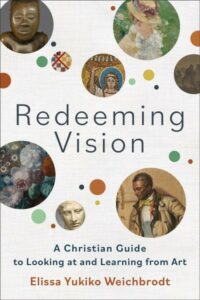 Redeeming Vision: A Christian Guide to Looking at and Learning from Art Elissa Yukiko Weichbrodt (Baker Academic) $29.99 OUR SALE PRICE = $23.99
Redeeming Vision: A Christian Guide to Looking at and Learning from Art Elissa Yukiko Weichbrodt (Baker Academic) $29.99 OUR SALE PRICE = $23.99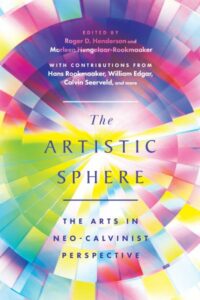 The Artistic Sphere: The Arts in Neo-Calvinist Perspective edited by Roger Henderson and Marleen Hengelaar-Rookmaaker (IVP Academic) $45.00 OUR SALE PRICE = $36.00
The Artistic Sphere: The Arts in Neo-Calvinist Perspective edited by Roger Henderson and Marleen Hengelaar-Rookmaaker (IVP Academic) $45.00 OUR SALE PRICE = $36.00
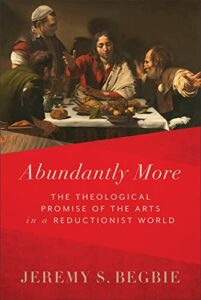 Abundantly More: The Theological Promise of the Arts in a Reductionist World Jeremy S. Begbie (Baker Academic) $39.99 OUR SALE PRICE = $31.99
Abundantly More: The Theological Promise of the Arts in a Reductionist World Jeremy S. Begbie (Baker Academic) $39.99 OUR SALE PRICE = $31.99
I’ve highlighted this previously, but surely it is, as one reviewer insisted, “A remarkable achievement that breaks new ground.” It is a bit above my pay grade, mature theological study that it is, but I simply have to list it here as one of the Best Books in the genre in this year of our Lord 2023.
Here he is doing much more than affirming that God cares about our creative juices or saying that our faith should give us lenses through which we can perceive goodness and delight in the arts of our fellow humans.In Abundantly More Begbie is making a major argument against one of the grand themes of Western philosophy and culture, a notion often summed up in the word “reductionism.” Think of C.S. Lewis’s The Abolition of Man, perhaps, or other critics who explain how reducing life to just this or that is always troubling and never ends well. No, we need a robust, opened-up, multi-dimensional view of things, appreciating the very “teeming” creation God has given us.
As it says on the back, “In a culture that so often seems to shrink and flatten our vision, reducing the world to mere atoms and us to mere things, the arts can break our imaginations open.”
James K.A. Smith has written much against this anti-creational vision or reductionism, and recently, in a column in Image (the arts journal he edits) he explained how very important this new book is. Here is what Smith said on the back cover; he happens to love the book, and I trust his judgments on these things a lot.
BEST BOOK ON CREATION CARE
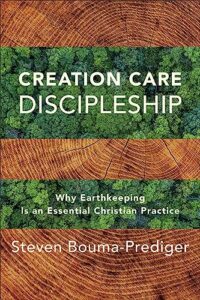 Creation Care Discipleship: Why Earthkeeping Is an Essential Christian Practice Steven Bouma-Prediger (Baker Academic) $25.99 OUR SALE PRICE = $20.79
Creation Care Discipleship: Why Earthkeeping Is an Essential Christian Practice Steven Bouma-Prediger (Baker Academic) $25.99 OUR SALE PRICE = $20.79
Almost every year we tip our hand about our own reading habits and what we try to curate for our customers by highlighting books like this. Steve has already carried away a Hearts & Minds award (see above) but we’re offering him this second award: hooray! This is the best book on this topic I’ve read all year. And I’ve read a lot, believe you me. As I have said before, I find Bouma-Prediger exceptionally helpful, wise, thorough, deeply Biblical without being tediously exegetical. But he opens up so much, brings so much to the fore, and helps us all understand how creation care and ecological insight is central to the calling of all Christians, integral, not incidental (as writer Steve Garber might say) to our life of discipleship.
Not unlike the major work Beyond Homelessness, Steven here offers exceptional, fresh, creative, and faithful Biblical meditations between each chapter. These, too, are worth the price of the book, keeping the faithful eye on Scripture and showing the extraordinary way in which this story (that “begins and ends with rivers and trees”) should shape our daily lifestyle. Hooray.
I love the many blurbs on Steve’s book that commend him as a teacher, for this clear distillation of his several big books, and for his passion as an outdoor adventure guy. Hear this, and then buy this book, please:
I was twenty-one years old when I read my first Bouma-Prediger book. From that moment on, my life has been a sequence of events reverberating from reading this brilliant thinker. This book will have the same effect on a whole new generation. I can’t commend it enough. — A. J. Swoboda, Bushnell University; author of After Doubt
HONORABLE MENTIONS about creation care
I’ve read a number of other books on a Biblical-theological vision of creation care, the climate crisis and such and I want to highlight these other two as, among others, exceptional and stellar. Thank you to the authors and their publishers for allowing us to stock such good books. I hope your favorite local, indie bookseller has these sorts of things. If not, send us an order pronto. We’ve got ‘em! For now start here.
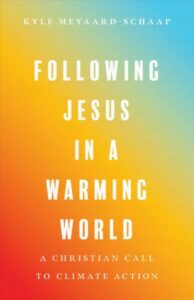 Following Jesus in a Warming World: A Christian Call to Climate Action Kyle Mayaard-Schaap (IVP) $18.00 OUR SALE PRICE = $14.40
Following Jesus in a Warming World: A Christian Call to Climate Action Kyle Mayaard-Schaap (IVP) $18.00 OUR SALE PRICE = $14.40
We highlighted this when it first came out, suggesting it was one of the best evangelical studies of creation care, a theology of earth-keeping, and an accessible study of recent research in climate change science. More and more young Christians are waking up to these realities and Meyaard-Schaap (as vice president of the Evangelical Environmental Network) knows a lot about this; he was previously the national organizer and spokesperson for Young Evangelicals for Climate Action.
Blurbs on the back are moving and compelling, from Kristin Kobes Du Mez (who calls it “an essential guide”), Debra Rienstra, Bill McKibben and Michael Wear (who reminds us that this book helps us see anew how “caring for the environment and how issues of environmental praise and degradation can bring us closer to Jesus.”)
 So We & Our Children May Live: Following Jesus in Confronting the Climate Crisis Sarah Augustine & Sheri Hostetler with a foreword by Patty Krawec (Herald Press) $18.99 OUR SALE PRICE = $15.19
So We & Our Children May Live: Following Jesus in Confronting the Climate Crisis Sarah Augustine & Sheri Hostetler with a foreword by Patty Krawec (Herald Press) $18.99 OUR SALE PRICE = $15.19
What makes a book like this stand out other than the sheer urgency and centrality of this topic for contemporary faithfulness? What does a new book bring to our reading table that makes it necessary, among the many others? It’s a fair question, but there is something about this one that makes me want to shout it from the rooftops. We honor it in this “best of” list because it is urgent, yes, but also because it is so very nicely written, captivating, interesting, compelling.
And there is this key matter: as they say on the back cover, “ecological justice requires us to challenge our assumptions about creation and our relationship to it. It requires decolonization. We must turn to the leadership of Indigenous communities who struggle for all life as protectors of land and water, and we must call on people of faith to join them…”
There are other important scholarly works about environmental racism, about decolonizing the way in which most white folks think about environmental stewardship, about the relationship between ecological renewal and people of color. This one gets at all that from a very distinctively Christian perspective and is lovely in helping us all see the ecological crisis as a lively invitation to rethink a lot, and reassess our typical theological views, postures, practices, and habits.
Nathan Cartagena, a professor of philosophy of Wheaton College says the book is “a tour de force” and “a gift for us, our children, and our children’s children.” He is right. Native author Kaitlin B Curtice calls it “essential.” She is right.
You may know of Sarah and Sheri from their important work Dismantling the Doctrine of Discovery podcast. (Sarah Augustine also wrote a book with that same title.) Both are active leaders on justice issues from within their Mennonite faith communities.
FAVORITE 2023 BOOKS ABOUT FOOD & COOKBOOKS
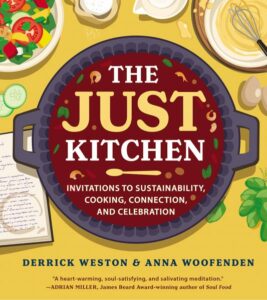 The Just Kitchen: Invitations to Sustainability, Cooking, Connection, and Celebration Derrick Weston & Anna Woofenden (Broadleaf Books) $29.99 OUR SALE PRICE = $23.99
The Just Kitchen: Invitations to Sustainability, Cooking, Connection, and Celebration Derrick Weston & Anna Woofenden (Broadleaf Books) $29.99 OUR SALE PRICE = $23.99
We love and concur with Adrian Miller, a James Beard award-winning author of Soul Food, who calls this a “heart-warming, soul-satisfying, and salivating meditation.” But it is more than a meditation — it is a handbook, a cookbook, a guidebook, and, yes, a theological and political exploration of justice in our foodways and cooking habits. It is a meditation on that room in our homes we call the kitchen and it is a reflection on those memories we have of food, eating, family, and nourishment. Of course as justice-oriented followers of Jesus — one black, one white — they bring an edge of urgency and a lot of joy to the journey.
The black and white illustrations are handsome enough, if inadequately repetitive, so some touches of color would have made the design considerably better. Still, this is one of our very favorite books in this genre in many a year. We toast the authors and cheer for their good work. Hooray.
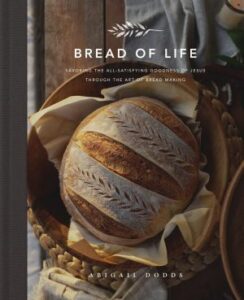 Bread of Life: Savoring the All Satisfying Goodness of Jesus Through the Art of Bread Making Abigail Dodds (Crossway) $29.99 OUR SALE PRICE = $23.99
Bread of Life: Savoring the All Satisfying Goodness of Jesus Through the Art of Bread Making Abigail Dodds (Crossway) $29.99 OUR SALE PRICE = $23.99
This beautiful book does not have the full-on Kingdom vision of food and sustainability and justice that is shared in The Just Kitchen and its God-centered devotional nature could have been expanded to include a bit more about the social ethics of food preparation and faithful eating. Still, it is nothing short of one of the most handsome books of the year, with lovely design touches from the inside covers to the type font to the warm, artful pictures. The text is dense and serious, if warm and lovely.
The topic is bread-making but the theme is God’s provision. As the publisher notes, “in this beautifully-photographed book, she shares 11 delicious recipes and shows you how to find your ultimate fulfillment through Christ, the all-satisfying bread of life.”
I worry sometimes when an author sets out to celebrate something good in God’s creation — as we should — and then merely “uses” it to make a bigger, “spiritual” point. I do not think this is the case, here, as she naturally weaves together recipes and redemption, food and faith, bread and the Body of Christ. Sure, it is finally, mostly, a Godly devotional, full of insights pointing us to desire God above all. But, man, those recipes look fabulous! From “Not Your Average Zucchini Bread” to “Weeknight Naan” to “Holiday Chocolate Babka” to something she calls “everyday cottage bread” (and more) these are so fun. I wish she had a gluten-free option for those with Celiac or serious gluten allergies…
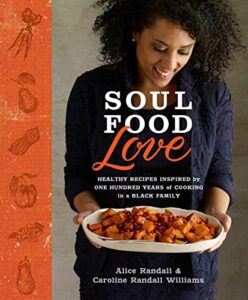 Soul Food Love: Healthy Recipes Inspired by One Hundred Years of Cooking in a Black Family Alice Randall & Caroline Randall Williams (Potter) $30.00 OUR SALE PRICE = $24.00
Soul Food Love: Healthy Recipes Inspired by One Hundred Years of Cooking in a Black Family Alice Randall & Caroline Randall Williams (Potter) $30.00 OUR SALE PRICE = $24.00
We admittedly do not do much fancy cooking and we don’t know that much about historic black cooking. I’ve read (and listened to radio documentaries) about the legendary history and sociology of black cooking. When we discovered this fabulously illustrated cookbook, complete with sidebars and historic notes, we thought it seemed just wonderful. The great Viola Davis has a blurb on the back saying “Soul Food Love has preserved our traditions but reinvented how they’re prepared. Its focus on health is a godsend.” So there ya go: a healthy mother-daughter duo who “reclaim and redefine soul food — with 80 recipes to help everyone live longer and stronger.”
As the back cover puts it, “Soul Food Love relates the author’s fascinating family history, which mirrors that of much of black American in the twentieth century, explores the often-fraught relationships African American women have had with food, and forges a powerful new way forward that honors their cultural and culinary heritage.”
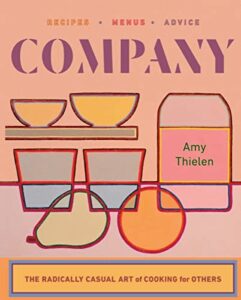 Company: The Radically Casual Art of Cooking for Others – Recipes, Menus, Advice Amy Thielen (Norton) $40.00 OUR SALE PRICE = $32.00
Company: The Radically Casual Art of Cooking for Others – Recipes, Menus, Advice Amy Thielen (Norton) $40.00 OUR SALE PRICE = $32.00
It is curious what we end up finding to carry in our Dallastown store — out of dozens of reviews of forthcoming or brand new cookbooks this one caught my eye. I didn’t realize that Amy Thielen was a beloved and respected food writer and cook, but I liked what they said about its inventiveness and how it was designed for pleasurable, creative cooking for those who say “let’s do it at my house.” I lived the title, a phrase our family used as I was growing up, about having “company.” (Do people still say that?) I know that many church groups and missional communities are increasingly teaching about hospitality and the ministry of shared meals and home events and this seemed, if a touch high-brow and urbane, pretty darn cool.
Who of us shouldn’t throw a few more parties?
Ends up I was right: this is on the “Year’s Best Books” list of nearly every major foodie publication and has gained rave reviews from all the major papers. Epicurious named it the Best Cookbook of 2023. What struck me was a NPR interview where an impressive critic said it was her favorite cookbook to read — that she had it by her bed, enjoying the instructions and advice and visions of hospitality. The first part I read was “A Note on Cleaning Up” where she admits that “we cookbook people” don’t talk about that much. Uh-huh.
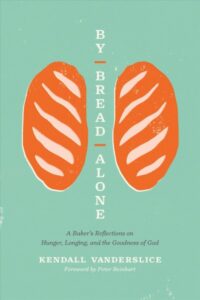 By Bread Alone: A Baker’s Reflections on Hunger, Longing, and the Goodness of God Kendall Vanderslice (Tyndale) $17.99 OUR SALE PRICE = $14.39
By Bread Alone: A Baker’s Reflections on Hunger, Longing, and the Goodness of God Kendall Vanderslice (Tyndale) $17.99 OUR SALE PRICE = $14.39
Bread is central to God’s story— and your story, too, she says. I hailed this when it first came out early this past year as a gem — a memoir, a theological treatise, a missional project of care and hospitality. Vanderslice is a graduate of Wheaton College, Boston University, and Duke Divinity School so you can surmise she knows her stuff. She does workshops on bread baking as a spiritual practice and while the above volume – an oversized and exceptionally attractive cookbook and devotional — may cover somewhat similar grounds, this really is broader and remarkably interesting.
The back cover tells us that Kendall has struggled with hunger for as long as she can remember — “hunger for bread, yes, but also for community and the ability to “tase and see” the goodness of God. She has learned that bread offers a unique opportunity to heal our relationship to the Body of Christ — and our own bodies.”
By Bread Alone weaves her own faith-filled journey together with original recipes and stories about bread in Scripture, in church history, and in our lives.
By Bread Alone is a powerful invitation into the rhythms of baking and the rhythms of faith. As Kendall explains, these are complex journeys of nuance and transformation that mirror each other. Through a robust exploration of breadmaking and her own story, Kendall vulnerably and insightfully offers an alternative to the “Wonder Bread theology” that often plagues the church. This book nourishes and satisfies our deepest longings for the Bread of Life. — Kat Armas, author of Abuelita Faith and Sacred Belonging: A 40-Day Devotional on the Liberating Heart of Scripture
By Bread Alone is a soulful, searching glimpse into trusting the goodness of God when it seems most opaque. Kendall Vanderslice trades toxic positivity for the promise of sustenance, and the result is deeply honest and curiously comforting. These pages are dusted with the flour of daily bread. If you are lost, longing, hope-weary, or barely hanging on (aren’t we all?), read this and be nourished. — Shannan Martin, author of Start with Hello and The Ministry of Ordinary Places
BEST BOOKS OF BIBLICAL STUDIES
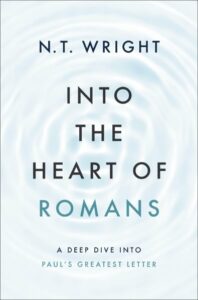 Into the Heart of Romans: A Deep Dive Into Paul’s Greatest Letter N.T. Wright (Zondervan Academic) $29.99 OUR SALE PRICE = $23.99
Into the Heart of Romans: A Deep Dive Into Paul’s Greatest Letter N.T. Wright (Zondervan Academic) $29.99 OUR SALE PRICE = $23.99
The last major book Tom Wright has released in the US was the Galatians commentary in the Eerdmans “Commentaries for Christian Formation” which came out in 2021. There will be a new co-authored Wright book (Jesus and the Powers: Christian Political Witness in an Age of Totalitarian Terror and Dysfunctional Democracies — we are taking pre-orders) coming in March. For now, amidst a newly edited edition of his New Testament translation (now called The New Testament for Everyone) and the new editions of his compact-sized NT commentaries (with new covers and study apparatus in the back) we have this extraordinary release, a publishing event of such importance that I’m surprised we haven’t gotten more orders than we have. It is a major work, if not overly technical, and a bit of a new angle on any number of central theological concerns emerging from his study of “Paul’s greatest letter.” Dating back to controversies from his early lectures on Jesus and his first entry on Romans in theNew Interpreter’s Bible Commentary, Wright has long been attracted to Romans. This, interestingly, is not a full commentary on all of Romans, as such, but is a deeper dive into Romans 8.
Naturally, he moves backwards and forwards as deftly as anyone, framing all of Paul’s magisterial letter by the broad “acts” of the unfolding Biblical drama. He and Brian Walsh worked out some of that seminal stuff years ago (and it shows up often in Wright’s work, so I was glad to see, of the very few commentaries he cited, he names Romans Disarmed by Walsh & Keesmaat.) If you love Romans 8 — and if you do not, you should! — then you need this book. Thanks be to God for new looks at the old, old, story.
N. T. Wright has long made it clear that Romans 8 is a text that is dear to his own heart and understanding of Paul. In this book, we encounter Wright as pastor, professor, and scholar. He teaches us how to read a text (as professor), what he discovers in the text (as scholar), and why Paul’s message in one of his most significant passages still matters for the church today (as pastor). It was also refreshing to witness Wright model the ability to grow as an exegete revising one’s opinion when better readings present themselves. This book is an exemplar of a pastorally and exegetically rich analysis of a dense but rewarding section of Paul’s most famous letter. — Esau McCaulley, professor of New Testament, Wheaton College, author of Reading While Black.
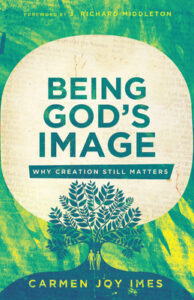 Being God’s Image: Why Creation Still Matters Carmen Joy Imes (IVP Academic) $22.00 OUR SALE PRICE = $17.60
Being God’s Image: Why Creation Still Matters Carmen Joy Imes (IVP Academic) $22.00 OUR SALE PRICE = $17.60
One of the great highlights of 2023 for our work lives was selling books, as we do, at the Jubilee conference in Pittsburgh. One of the main-stage speakers and rock stars of the event last year was Carmen Joy Imes, an upbeat scholar with a heart for teaching and a passion for deep Biblical research that matters. Although she has written other good stuff , her important, award-winning book called Bearing God’s Name: Why Sinai Still Matters came out in 2019; this is a companion and is even better than that great one. It is asking, very much in light of the Genesis creation narrative, what it means to be human. It is a question that “proves foundational as we seek to understand purpose, identity, and significance.” In this very readable, but meaty, book, she offers a theological rich exploration of the Imago Dei and the implications of this “kinship relationship with God” for work, sexuality, gender, creation-care, and our eternal destiny. This is a major book, not overly technical, and a joy for anyone that loves God’s Word.
An interesting little feature of this book is how she has partnered with the amazing folks at the BibleProject (indeed, Tim Mackie has a recommending blurb on the back) to offer video clips throughout the book which help illustrate her major points. What a delight! Very highly recommended.
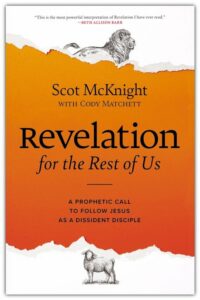 Revelation for the Rest of Us: A Prophetic Call to Follow Jesus as a Dissident Disciple Scot McKnight (Zondervan) $26.99 OUR SALE PRICE = $21.59
Revelation for the Rest of Us: A Prophetic Call to Follow Jesus as a Dissident Disciple Scot McKnight (Zondervan) $26.99 OUR SALE PRICE = $21.59
Almost every customer we talked to who has read this — save one, a good friend and Christian leader — has reported how much they enjoyed it, how much it either challenged them to think about Revelation in a new way or reinforced in their mind that they are not crazy to be suspicious of the end-times / rapture stuff that has for so captured some corners of the broader church. This book about “dragons, lambs, and strange beasts” can help us follow Jesus today, and it isn’t by preparing to applaud war in the Middle East, expecting a tribulation and rapture, but by resisting those popular misconceptions about this mysterious book of the Bible and realizing what is really going on.
There are a lot of books on this (just ask and I’ll send you a list) and there are deeper and more systematic commentaries. For an overview with an eye to reclaim a more legitimate and faithful and fruitful reading written by a beloved evangelical scholar, Revelation for the Rest of Us by Scot McKnight deserves a huge thanks and earns this silly little award from us here in South-Central Pennsylvania. Our hat is tipped.
Here are two good endorsements that will show you why we want to honor this book as one of the favs of 2023. One is by a woman who is a Texas, Baptist historian, the other a Methodist New Testament scholar from Baltimore, both very fine authors and leaders. Check this out:
A brilliant, fast-paced narrative that does so much more than make an incomprehensible book comprehensible. It shows us how white evangelicals lost our theological grounding, becoming the very monster we were supposed to resist; it emboldens us to become dissident disciples, leaving team dragon and returning to the side of the Lamb; and it gives us hope that a world where justice rolls down like water will one day be more than a dream. This is the most powerful interpretation of Revelation I have ever read, reorienting us away from bizarre prophecies and fiction bestsellers back to the truth of the gospel. You do not want to miss it. — Beth Allison Barr, Professor of History at Baylor University, author of The Making of Biblical Womanhood: How the Subjugation of Women Became Gospel Truth
If Revelation is not a book for speculation about the antichrist and the millennium, what is it? Scot McKnight and Cody Matchett have gifted the church, especially (but not only) its evangelical wing, with a revelation about Revelation. It is a call for dissident discipleship. This challenging but also pastoral book is a must-read for anyone concerned about the new forces of Babylon confronting the church and the world today. — Michael J. Gorman, Professor of Biblical and Theological Studies, St. Mary’s Seminary & University, Baltimore, author of Reading Revelation Responsible: Uncivil Worship and Witness Following the Lamb into the New Creation
BEST BOOK TO HELP US UNDERSTAND THE PALESTINIAN CRISIS
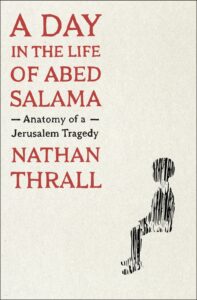 A Day in the Life of Abed Salama: Anatomy of a Jerusalem Tragedy Nathan Thrall (Metropolitan Books) $29.99 OUR SALE PRICE = $23.99
A Day in the Life of Abed Salama: Anatomy of a Jerusalem Tragedy Nathan Thrall (Metropolitan Books) $29.99 OUR SALE PRICE = $23.99
We did one long BookNotes list of titles that we pulled off our shelves back with the war in Gaza was in its early days and tried to offer balanced, wise, informative resources to help just a bit in understanding (as the great book edited by Mae Cannon puts it, A Land Full of God.) On that list we named one book that I had just started; it had gotten considerable attention in mainstream literary and publishing circles for being so moving and well written, but I do not know many faith-based spaces who have talked about it much.
I was blown away by this book and name it here as one of the most unforgettable books I have read this year, one I am haunted by, one I wish I could press into the hands of those who seem oblivious to the ongoing injustices perpetrated by Israel with their crass land grabs, occupational forces, road blocks, checkpoints, arrests without due process, and the like. These repressive conditions should be well known and those that don’t admit to some awareness are being willfully, sinfully, ignorant; of course, since some Palestinians have resorted to violent resistance and some of those have evolved into despicable terrorist organizations (like Hamas and Hezbollah) who have done horrific things, it is hard to offer a balanced and wise view, trying to be the peacemakers which we are called to be. Always we must condemn the violence on both sides and try to understand the decades and generations of injustices that have lead to this horrible situation and the understandable fears and hurts on both sides of the literal walls and borders.
This remarkable book is about a Palestinian school bus that was in a horrible accident while visiting a play space just beyond a checkpoint in which, we eventually learn, some little children died, burned to death in this terrible event. Of course the ambulances couldn’t (or wouldn’t) come in time, the checkpoint backups which are routine (if dehumanizing and frustrating) inconveniences for Palestinians who live and work in Jerusalem’s sprawling neighborhoods, became barriers for parents to find their children in the hospitals to which they were taken (or not) and, eventually, the appropriate morgues. It is nothing if not tragic, large social and political issues made somewhat understandable in this one particular episode of sadness. Some of the scenes are brutal and much is terribly sad.
Much of the book, though, follows the father of the title, tracing back his life and work and joys and loves, his arranged marriages, his faith and his many good friendships with Jews and Arab Christians. Some of his Palestinian Muslim relatives are more radicalized, most are not. There is a multi-generational saga being played out and much of it is simply fascinating. Where people live, what they do, how they navigate the infuriating laws and lack of rights in their own homelands — not unlike the old apartheid restrictions in awful South Africa — is helpful to read about. If it were not so fullof gravitas, I’d say it was fascinating; seeing how dignity and love and family and human-scale stuff goes on, even in times of turmoil, is a good benefit of the read.
Much of the Day in the Life of… book, which reads almost like a page-turning novel, follows this extended family even as the narrative heart focuses on this awful day when they could not find if their child was one who died or not and the indignities faced at the hands of Israeli repression and bureaucracy.
Like the best creative nonfiction and long-form narrative reporting, there are no singular good guys or bad guys (although this one way into understanding the daily grind of persecution and injustice experienced by most Palestinians I have ever read.) This is not a screed nor even a passionate bit of advocacy. It is storytelling at its finest, around a troubling and unforgettable vignette, and the good and bad people and systems that surround this “day in the life” of one Abed Salama.
Nathan Thrall knows this land and its peoples well. He is a great reporter, and good writer, and an excellent person to tell this tale. I agree with the award winning scholar, historian, and writer Adam Hochschild, who describes it well:
It is hard to think of another book that gives such a poignant, deeply human face to the ongoing tragedy of Palestine. Thrall’s evocation of both a terrible crisis and the daily humiliations of life under occupation is nothing short of heartbreaking. — Adam Hochschild, National Book Award finalist and author of American Midnight
I know of no other writing on Israel and Palestine that reaches this depth of perception and understanding… One could read the book as a précis of modern Palestinian history embedded in the personal memories of many individuals, each of them drawn in stark, telling detail. To get to know them even a little is a rare gift, far more useful than the many standard, distanced histories of Palestine. –David Shulman, New York Review of Books
By the way, Abed and Haifa Salama’s five year old boy’s name was Milad.
SPECIAL AWARD OF HONOR – BEST OF SHOW
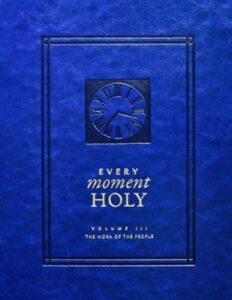 Every Moment Holy Volume III: The Work of the People edited and compiled by Douglas McKelvey (Rabbit Room Press) $35.00 OUR SALE PRICE = $28.00
Every Moment Holy Volume III: The Work of the People edited and compiled by Douglas McKelvey (Rabbit Room Press) $35.00 OUR SALE PRICE = $28.00
I don’t know what Best of Show really means outside of the dog world, but this is an award we are naming to seriously honor this extraordinary release, the third in the excellent series of Every Moment Holy prayer books published by the good folks at Rabbit Room Press. We are delighted to carry and commend this book for any number of reasons, not least because it is so very well made, so attractive, so well designed. (Huzzahs to my friend Ned Bustard for the layout and design, curating the art — some of which is his — and all the good details from the typography, colored ink, and ribbon marker.) This full-sized, leather-bound hardback volume is a sight to behold and a beauty to hold.
As important, but related to the elegant, beautiful design, it offers “the work of the people” — liturgies and litanies, spoken prayers and poetic pleas to God, written with liturgical grace and some unique rhetorical charm. Prayers books can be stuffy and overly wordy while many, these days, are nearly too colloquial and chummy. The Every Moment Holy books have struck a good balance, bringing us prayers to use in ordinary life moments (so there is indeed a mundane sort of ordinariness to them) but with an elegant sort of spiritual class in the vocabulary and the robust faith shaping them.
Indeed, these “liturgies” which attempt to consecrate “every moment” to holiness, are crafted, like the first in the series, for ordinary (and sometimes rather exceptional or unique) moments in our daily lives. (The second volume in the Every Moment Holy series, is specifically about loss, grief, sorrow, and lament. It is loaded with various sorts of prayers and liturgies for reading in various sorts of circumstances, but it is blessed by that specificity.) This third one, like the first, covers the most mundane moments to the most unusual. It has liturgies for various jobs and vocations, liturgies of creation and recreation, blessings and celebrations, petition and provision. There are prayers of sorrow and “prayers of the moment.” I cannot tell you just how grateful I am for the rich theology which undergirds these 400 glorious pages. I promise you, you will find this useful.
Unlike the first two, this new 2023 one, Volume III, is crafted by a variety of authors and the art, though in keeping with the style of the former, is made by several different contributing artists. In this new one you will find prayerful liturgies by known authors and poets (from Malcolm Guite, Luci Shaw, Leslie Anne Bustard, Fernando Ortega, Sho Baraka, Philip Yancey) and includes (unlike in the previous volumes) words from older saints such as Augustine, St Francis, John Donne, Johannes Kepler and Dorothy Sayers.)
PART TWO OF OUR FAVORITE READS OF 2023 WILL APPEAR SOON. There will be some really fun books, some serious stuff, a few scholarly ones, and a bunch of our best delights. Please stay tuned…
+++
TO PLACE AN ORDER
PLEASE READ, THEN SCROLL DOWN AND CLICK ON THE “ORDER HERE” LINK BELOW.
It is helpful if you tell us how you want us to ship your orders.And if you are doing a pre-order, tell us if you want us to hold other books until the pre-order comes, or send some now, and others later… we’re eager to serve you in a way that you prefer. Let us know your hopes.
The weight and destination of your package varies but you can use this as a quick, general guide:
There are generally two kinds of US Mail options and, of course, UPS. If necessary, we can do overnight and other expedited methods, too. Just ask.
- United States Postal Service has the option called “Media Mail” which is cheapest but can be a little slower. For one typical book, usually, it’s $4.12; 2 lbs would be $4.87. This is the cheapest method available and seems not to be too delayed.
- United States Postal Service has another, quicker option called “Priority Mail” which is $8.50, if it fits in a flat-rate envelope. Many children’s books and some Bibles are oversized so that might take the next size up which is $9.20. “Priority Mail” gets much more attention than does “Media Mail” and is often just a few days to anywhere in the US.
- UPS Ground is reliable but varies by weight and distance and may take longer than USPS. Sometimes they are cheaper than Priority. We’re happy to figure out your options for you once we know what you want.
If you just want to say “cheapest” that is fine. If you are eager and don’t want the slowest method, do say so. It really helps us serve you well so let us know. Keep in mind the possibility of holiday supply chain issues and slower delivery… still, we’re excited to serve you.
BookNotes
SPECIAL
DISCOUNT
20% OFF
ALL BOOKS MENTIONED
+++
order here
this takes you to the secure Hearts & Minds order form page
just tell us what you want to order
inquire here
if you have questions or need more information
just ask us what you want to know
Hearts & Minds 234 East Main Street Dallastown PA 17313
read@heartsandmindsbooks.com
717-246-3333
Sadly, as of January 2024 we are still closed for in-store browsing. COVID is not fully over and is truly on the rise. Since few are reporting their illnesses anymore, it is tricky to know the reality but the best measurement is to check the waste water tables to see the amount of virus in the eco-system. It is now getting worse. It is still important to be aware of how risks we take might effect the public good — those at risk, while not dying from the virus, are experiencing long-term health consequences. (Just check the latest reports of the rise of heart attacks and diabetes among younger adults, caused by long Covid.) It is complicated, but we are still closed for in-store browsing due to our commitment to public health (and the safety of our family who live here, our staff, and customers.) Our store is a bit cramped without top-notch ventilation, so we are trying to be wise. Thanks for understanding.
We will keep you posted about our future plans… we are eager to reopen. Pray for us.
We are doing our curb-side and back yard customer service and can show any number of items to you if you call us from our back parking lot. It’s sort of fun, actually. We are eager to serve and grateful for your patience as we all work to mitigate the pandemic. We are very happy to help, so if you are in the area, do stop by. We love to see friends and customers.
We are happy to ship books anywhere.
We are here 10:00 – 6:00 EST / Monday – Saturday. Closed on Sunday.

